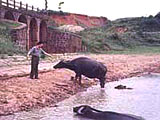 Although areas along the middle and lower reaches of the Yangtze River are being threatened by flood disaster, East China's Shandong Province is experiencing its worst drought in 100 years.
Although areas along the middle and lower reaches of the Yangtze River are being threatened by flood disaster, East China's Shandong Province is experiencing its worst drought in 100 years.
Ironically, about 30 million hectares of land and more than 1 million people in Shandong's central, northern and southwestern parts are facing a severe water shortage. Experts say exceptionally low seasonal rainfall is the cause of the drought.
Rainfall in the province from June 1 to August 29 had only totaled 194 millimeters, about half of the normal amount, according to statistics from the local water resources bureau.
Latest statistics show that water reserves in all projects in the province are only holding about 3.9 billion cubic meters of water, about 4.1 billion cubic meters less compared with the same time in previous years.
Meanwhile, the flood peak of the Yangtze River has arrived in Central China's Jiangxi Province.
The water level of Jiangxi's Poyang Lake, which is one of the biggest lakes along the Yangtze, was yesterday more than 1.27 meters above the warning level.
Jiangxi's government has issued an alert calling people to make more efforts to prevent the flood from destroying their lives and wealth.
As the flood peak moves down the river, the water level of the Yangtze is expected to surpass warning levels in provinces in the lower reaches, such as Anhui and Jiangsu, in the following days.
Although the flood peak is moving to the sea, efforts to fight the flood are still quite concentrated in areas such as Hunan, Hubei and Jiangxi provinces, as thundershowers and heavy rain will continue in coming days.
While lakes and rivers in southern China are bursting, the upper part of the Nansi Lake, one of the major reservoirs of Shandong Province, has dried up. Only an estimated 3 million cubic meters of water are left.
In Jining, the drought is endangering more than 320,000 people in 350 villages.
The 130-kilometre Jining section of the Beijing-Hangzhou Grand Canal has been cut off since July 9.
The rural areas of Jining, Liaocheng, Dezhou, Heze, Jinan and Binzhou are the hardest hit, accounting for approximately 60 percent of the total area affected by the drought.
It is estimated that the economic losses in the area this summer would reach 7 billion yuan (US$846.4 million).
Officials from the provincial anti-drought office say consolidated supervision on water resources will be regulated in the future.
In areas with good water resources, more efforts will be put in farm management, assuring high production.
For other places, according to water reserves, efforts will be emphasized on urban living, major industrial and mining enterprises, economic crops and autumn planting.
Precautions to measure against severe and long-term drought will be adopted.
Liaocheng, one of the most drought-afflicted cities, has put a total of 220 million yuan (US$ 26.6 million) into fighting the drought. There are more than 70,000 newly set-up machine-operated wells that have greatly helped irrigate local farmlands.
(China Daily August 30, 2002 )
|

